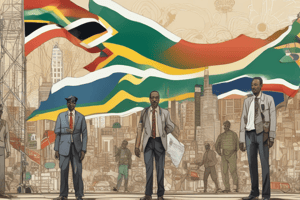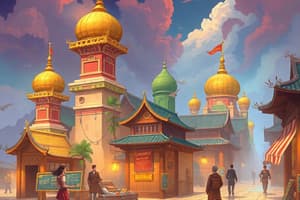Podcast
Questions and Answers
In a purely communist economic system, what is the primary characteristic regarding property ownership?
In a purely communist economic system, what is the primary characteristic regarding property ownership?
- Individual ownership of all means of production.
- Private ownership with government regulation.
- Collective ownership of property with no private ownership. (correct)
- Ownership distributed based on individual contribution.
Which economist is best known for advocating free markets and the concept of the 'invisible hand'?
Which economist is best known for advocating free markets and the concept of the 'invisible hand'?
- Adam Smith (correct)
- John Maynard Keynes
- Karl Marx
- Max Weber
What fundamental principle underlies the concept of a free market economy?
What fundamental principle underlies the concept of a free market economy?
- Minimal government intervention with prices determined by supply and demand. (correct)
- Centralized planning by a council of economic experts.
- Extensive government control over prices and production.
- Equal distribution of wealth regardless of contribution.
What is the primary effect of competition among sellers in a free market?
What is the primary effect of competition among sellers in a free market?
Which term describes the transfer of a business or service from public (government) ownership to private ownership?
Which term describes the transfer of a business or service from public (government) ownership to private ownership?
What is a notable characteristic of Marxist economic theory?
What is a notable characteristic of Marxist economic theory?
How do cartels negatively impact a free market economy?
How do cartels negatively impact a free market economy?
What distinguishes fascism as an economic system?
What distinguishes fascism as an economic system?
Which of the following best describes 'economic freedom'?
Which of the following best describes 'economic freedom'?
What is the result of free trade among nations?
What is the result of free trade among nations?
Why is productivity considered a key factor for overall economic growth?
Why is productivity considered a key factor for overall economic growth?
What is the primary characteristic of hyperinflation?
What is the primary characteristic of hyperinflation?
What does 'Efficiency' mean in the context of economics?
What does 'Efficiency' mean in the context of economics?
What is the purpose of 'corporate governance'?
What is the purpose of 'corporate governance'?
What is 'crony capitalism'?
What is 'crony capitalism'?
According to Max Weber, what was a key factor in the emergence of capitalism?
According to Max Weber, what was a key factor in the emergence of capitalism?
What is the long-term impact of hyperinflation on an economy?
What is the long-term impact of hyperinflation on an economy?
How does strong enforcement of property rights contribute to economic growth?
How does strong enforcement of property rights contribute to economic growth?
How do you describe the role of government intervention in a socialist Economic system?
How do you describe the role of government intervention in a socialist Economic system?
Which scenario exemplifies the concept of 'crony capitalism'?
Which scenario exemplifies the concept of 'crony capitalism'?
Flashcards
Property Rights
Property Rights
Legal rights to use, control, and transfer property.
Adam Smith
Adam Smith
Father of modern economics; promoted free markets and the “invisible hand” theory.
Karl Marx
Karl Marx
Critic of capitalism; developed theories that inspired communism and socialism.
Max Weber
Max Weber
Signup and view all the flashcards
Communism
Communism
Signup and view all the flashcards
Fascism
Fascism
Signup and view all the flashcards
Marxism
Marxism
Signup and view all the flashcards
Socialism
Socialism
Signup and view all the flashcards
Privatization
Privatization
Signup and view all the flashcards
Free Market
Free Market
Signup and view all the flashcards
Competition
Competition
Signup and view all the flashcards
Cartels
Cartels
Signup and view all the flashcards
Capitalism
Capitalism
Signup and view all the flashcards
Economic Freedom
Economic Freedom
Signup and view all the flashcards
Free Trade
Free Trade
Signup and view all the flashcards
Productivity
Productivity
Signup and view all the flashcards
Hyperinflation
Hyperinflation
Signup and view all the flashcards
Economic Growth
Economic Growth
Signup and view all the flashcards
Efficiency
Efficiency
Signup and view all the flashcards
Crony Capitalism
Crony Capitalism
Signup and view all the flashcards
Study Notes
- Property rights: Legal rights govern the use, control, and transfer of property.
- Adam Smith: Known as the father of modern economics, he championed free markets and the "invisible hand" theory.
- Karl Marx: A critic of capitalism, he developed theories that inspired communism and socialism.
- Max Weber: Sociologist who connected capitalism to Protestant ethics and bureaucracy.
- Communism: Economic system characterized by collective ownership of property and the absence of private ownership.
- Fascism: Authoritarian system that combines dictatorial power, suppression of opposition, and controlled capitalism.
- Marxism: Political and economic theory advocating for class struggle and the abolition of capitalism.
- Socialism: A system where the government or community owns the means of production.
- Privatization: Transferring ownership of a business or service from public to private entities.
- Free market: Economic system with minimal government intervention, where prices are determined by supply and demand.
- Competition: Rivalry among sellers to attract customers, fostering innovation and lowering prices.
- Cartels: Groups of producers collude to control prices and limit production, thereby reducing competition.
- Capitalism: Economic system grounded in private ownership, the profit motive, and free markets.
- Economic freedom: The capacity of individuals to control their economic activities, like buying, selling, working, and investing.
- Free trade: International trade conducted without tariffs, quotas, or other restrictions.
- Productivity: Measure of output per unit of input, such as labor, and a key factor in economic growth.
- Hyperinflation: Extremely rapid inflation that severely diminishes the value of currency.
- Economic growth: Increase in a nation’s output of goods and services over a period.
- Efficiency: The optimal utilization of resources to maximize output and minimize waste.
- Corporate governance: Systems and rules that dictate how companies are directed and controlled.
- Crony capitalism: Corrupt form of capitalism where businesses flourish due to close ties with government officials.
Studying That Suits You
Use AI to generate personalized quizzes and flashcards to suit your learning preferences.




